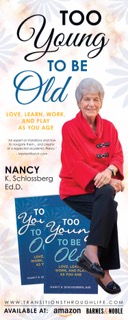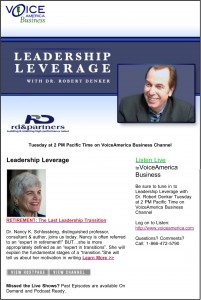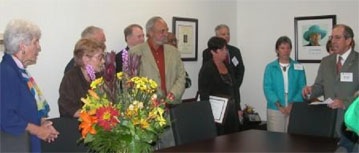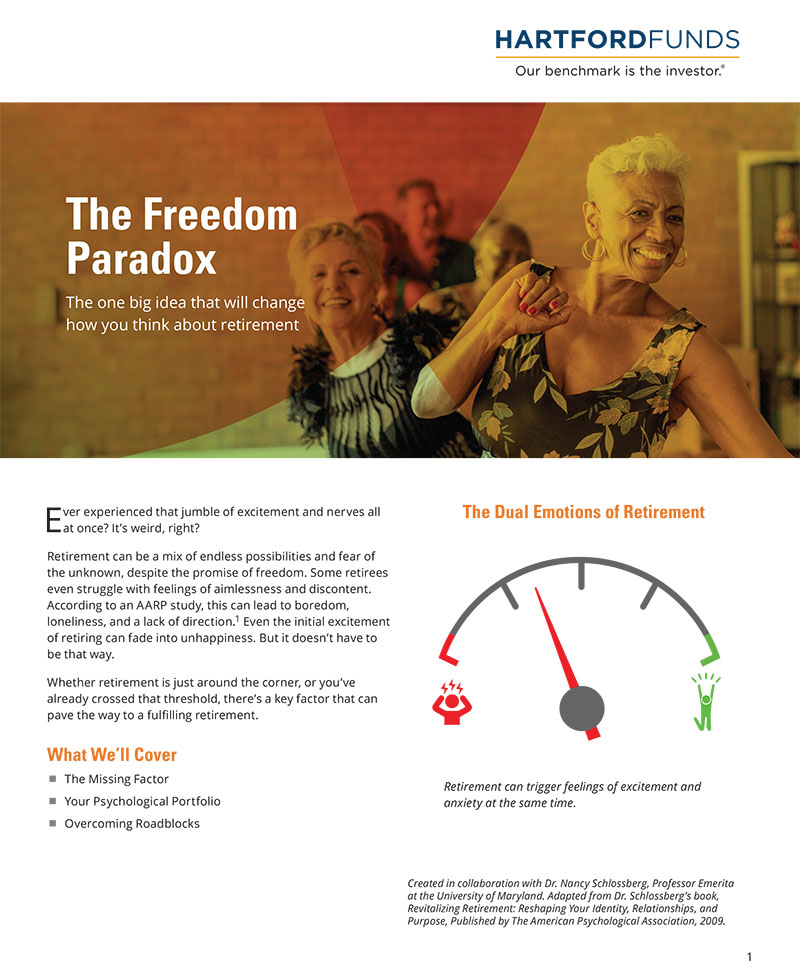Articles & Interviews
Recent News
January 16, 2026: Nancy was featured in The Wall Street Journal – The Retirement Crisis No One Warns You About: Mattering
The moving boxes were barely unpacked when Nancy Schlossberg and her husband, Steve, joined a small group of recent retirees for dinner in their new city of Sarasota, Fla. When a former medical school dean asked Nancy, who had just stepped away from a 40-year career in higher education, about her retirement plans, she told him she hoped to consult with local nonprofits. “I’m excited to get involved and see how I can contribute,” she said.
The former dean gave her a weary smile. He’d hoped to assist in teaching a biology course after retiring, he said, but every attempt had gone nowhere. Around the table, heads nodded. Despite decades of expertise, each person there was stunned by how hard it was to find meaningful ways to contribute after winding down their careers.
What these retirees were describing wasn’t just disappointment in a lack of opportunities. It was an erosion in something far more fundamental—their sense of mattering, the deep human need to feel valued and to have a chance to add value to the world. We plan for our wealthspan and healthspan, mapping out financial security and physical well-being. Yet very few of us prepare for an equally essential dimension of retirement: our mattering span, or how we will continue to feel seen, useful and capable of making a difference in this next chapter of life.
The consequences of neglecting our sense of mattering are measurable and profound. A 2020 meta-analysis published in the journal Healthcare, drawing on data from over 3,000 retirees, found that nearly a third experienced depressive symptoms, with higher rates among those pushed into retirement by illness, layoffs or mandatory exits. Other studies indicate that the psychological losses often embedded in retirement—feeling less valued, needed or connected—are strong predictors of postretirement depression.
More than 11,000 Americans turn 65 every day. By 2030, one in five will be of retirement age. As we live longer, sustaining a sense of mattering has become a defining challenge of aging. Research suggests it’s time to shift the question from How long will I live? to How will I continue to matter while I do?
To understand how to deal with the problem, it’s useful to think of mattering as having four main components, captured in the acronym SAID: feeling significant (seen and essential), appreciated (valued for your contributions), invested in (supported and cared for) and depended on (needed by others). These ingredients offer both a diagnosis—why retirement can feel destabilizing—and a solution for strengthening your mattering span at any age.
September 20, 2025: Nancy was featured in USA Today – Retirement is a major transition. How to prepare for that big life change.
July 2, 2025: Nancy was featured in USA Today – I am 96 and the picture of longevity. These are my tips for living longer and better.
January 10, 2025: Nancy was featured in Sarasota Magazine – Nancy Schlossberg Is a 95-Year-Old Rebel Who Isn’t Slowing Down
January 10, 2025: Nancy was featured on USA Today – Retirement requires reimagining your future. Here are ways to do it.
December, 2024: Nancy Partners with Dina Cheney in her latest prevention article – Having The Talk
August 11, 2024: HartfordFunds turns my book – Revitalizing Retirement – into a workbook – The Freedom Paradox
July 5, 2024: Too Young To Be Old – Featured at the Manila International Book Fair This Fall 2024 – Manila Book Fair
May 1, 2024: Article in AARP – It’s OK to Spend Some of Your Hard-Earned Savings
February 22, 2024: Article in AARP – How to Become a Mentor — and Why It’s Good for Your Health
December 20, 2023: Article in AARP Ethel – Thinking of Taking Your Grandkids on Vacation?
August 11, 2023: Article in Observer – Self-help author, age 94, encourages seniors to embrace their stage of life
June 5, 2023: Quoted in Article on The Atlantic – Semi-Retirees Know the Key to Work-Life Balance
January 2023: Quoted in Article on Huffpost.com – Before Your Parents Retire, Make Sure You Ask About These 6 Things
August 24, 2022: Florida Conference on Aging, Plenary Speaker – “Aging Rebels Don’t Give Up: They Reinvest in Life” (Click Here to read the speech)
August 2022: Quoted in Article on MarketWatch – ‘You don’t want to die at your desk sending an email.’ Beyond the numbers, are you ready to retire?
January 2022: Quoted in Article on MarketWatch – Retired and Bored, or Worse Yet, Boring? Try This
February 2022: Article on Next Avenue – Aging Rebels Don’t Give Up: They Reinvest in Life
January 2022: Quoted in Article on The Washington Post – How to Prevent Falls and Provide Comfort in a New Home for Seniors
December 2021: Quoted in Article on AARP.org – 10 Secrets of a Happy Retirement
July 2021 Invited on Podcast by Wes Moss –
The Link Between Life Transitions And A Happy Retirement
March 2021: Quoted in Article on MarketWatch by The Wall Street Journal – Have you invested in the psychological portfolio for retirement?
November 2020: Quoted in Article on MarketWatch by The Wall Street Journal – There are six types of retirees — which are you?
July 2020: Invited Speech at the American Psychological Convention – “I Don’t Need Your Rocking Chair” New Adventures in Retirement
June 2020: Quoted in TheAtlantic.com – The Coronavirus Is Scrambling Retirement, But There Are Ways to Move Forward
June 2020: Article on The British Psychological Society website Thepsychologist.bps.org.uk – Transitions with the Aging Rebels
February 2020: Quoted in Article on Time.com – ‘I Need to Continue to Be Active.’ Why Americans Are Retiring Later Than Ever
October 2019: Quoted in Article on AARP.org – Family Conflict: Your Marriage Can Suffer When You’re a Caregiver
October 2019: Quoted in Article on AARP.org – Family Conflict: Caregiving Can Affect Relationship With Loved One
October 2019: Quoted in Article on AARP.org – Family Conflict: Your Kids Can Help With Caregiving in Little Ways
September 2019: Article on Cornerstonelifecare.com – Bonding Among Generations
June 2019: Quoted in Article in The Saturday Evening Post – How to Retire
June 2019: Quoted in Article in Marketwatch.com by the Wall Street Journal – You’re probably not ready to retire — psychologically (Article also in June 3, 2019 edition of the Wall Street Journal)
January 2019: Article in Marketwatch.com – This 88-year-old has some advice about staying young — and happy
July 2018: Article in Nature.com – How retirement can give your career a new lease of life – Quoted saying:
Of course, scientists don’t always find retirement easy. Nancy Schlossberg thought it would be “a piece of cake”. In 1997, at the age of 68, and after 24 years as a counselling psychologist at the University of Maryland in College Park, she became an emerita and headed for Sarasota, Florida. There, she hoped she’d find ways to write or get speaking invitations. But it wasn’t that simple. “I get to Sarasota, and there I am without a purpose,” she recalls. “I was shocked.”
Schlossberg had to create her own opportunities. Because her professional expertise was in life transitions, she decided to study retirement. That work led to the first of three books that she has penned on the topic since ‘retiring’: Retire Smart, Retire Happy (American Psychological Association, 2003).
Through her post-retirement research, Schlossberg has worked out why it didn’t feel good to be suddenly purposeless in sunny Florida. Those who have retired, she learned, must shape a new identity. “That transition process, even if it’s something you wanted, can be very unsettling,” says Schlossberg. “But the most important thing tied to your identity is your sense of purpose. That’s what gives you the reason to get up in the morning.” Of course, that sense of purpose or identity needn’t be related to previous professional activities — but Schlossberg’s interviews with retired researchers indicate that they need something to define their lives.
July 2018: Article in Wusa9.com – The Best Places to Retire in 2018 – Quoted saying:
Tips for relocating retirees
Moving and retirement are two major life events that can have a wide-ranging impact on your fiscal, emotional and physical health. Nancy K. Schlossberg, author of several books including “Revitalizing Retirement: Reshaping Your Identity, Relationships and Purpose,” made a career studying these kinds of transitions. Her biggest piece of advice to retirees is to be patient.
“When you retire, you leave a role, relationships and daily routines,” she said. “There’s a period where you’re establishing a new role in life, new routines and relationships. That period between leaving the old life and starting the new life can be very bumpy. Remember, give yourself time.”
If retirees are considering relocation, Schlossberg recommends taking an extended vacation in the city of interest to give themselves a chance to see if it’s the right fit. Schlossberg lived and worked in Washington, but retired to Sarasota, Fla., where she had spent many summer vacations, but the transition was still difficult.
“I thought it would be a piece of cake, but it took longer for me to adjust than I expected,” she said. “I said once when I first moved there, if I could invent patience pills I would make a fortune.”
When you do settle on a new city, Schlossberg recommended using all the resources available to get involved and learn about the community, including the local paper, chambers of commerce and community colleges. Research the availability of lifelong learning options, cultural events and sports or exercise venues.
June 2018: Quoted in The Washington Post – Dying at your desk is not a retirement plan
April 2018: Interview with Jim Peacock of Peak-Careers.com
December 14, 2017: Article on Thirdage.com – Romance Has No Age Limit
December 14, 2017: Featured on Thirdage.com – Click here to read more
November 27, 2017: Article at AARP.org – Are You Afraid to Retire?
October 25, 2017: Nancy receives Visionary Award given by the Friendship Centers of Sarasota – Click here to read more
September 20, 2017: Article in MarketWatch by The Wall Street Journal – How to reinvent yourself – and stay happy – as you get older
September 1, 2017: Article in the Sarasota Herald Tribune – Keep learning, activate your brain, meet new people, learn new skills and continue your intellectual curiosity. That’s what it’s all about.
July 24, 2017: Article in Nextavenue.org – When Retirement Makes You Unhappy
July 19, 2017: Article in CapFinancial Partners – Far from Finished: Planning Successful Transitions
June 6, 2017: Article in Psychologytoday.com – Too Young To Be Old: Love, Learn, Work, and Play as You Age
June 5, 2017: Article by APA Books in Author Interview – Nancy Schlossberg: On Aging Gracefully
June 4, 2017: Article in The Sarasota Herald Tribune – Author Nancy Schlossberg Frames Aging Well as an Act of Improvisation
May 16, 2017: Article in Time.com – 4 Smart Tips for a Happy Retirement – From Someone Who’s Been There
May 9, 2017: Article in BottomLine – How to Handle Life’s “Nonevents”
April 20, 2017: Article in Money – How To Become A Happy Retiree
April 4, 2017: Article in Forbes – Which Of These Retirement Paths Will You Follow? and on Nextavenue.org – Which of These Retirement Paths Will You Follow?
September 26, 2016: Quoted in article by Dan Kadlec – The Real Retirement Stuggle: Defining Yourself as More Than the Sum of a Long Career
July 5, 2016: Quoted in article in Moneysense – Retirement Planning: Go Beyond the Numbers
December 22, 2015: Article in Sarasota Herald Tribunes’ Better Living – Does Planning Pay Off?
December 2015: Article – Widow In Waiting
September 21, 2015: Article in Sarasota Herald Tribunes’ Better Living – Creating Your Own Rituals
August 5, 2015: Quoted in Hardware Retailing article – How Do You Want To Spend Your Retirement Years?
July 21, 2015: Article in Sarasota Herald Tribunes’ Better Living – Do you have a coping strategy
May 26, 2015: Quoted in USA Today article – Ways to make a smooth transition to retirement
Apr 30, 2015: Quoted in USA Today article – Many headed for retirement haven’t talked to a financial adviser, poll finds
Apr 24, 2015: Article in the Perspectives Newsletter – Read More About It
Apr 21, 2015: Article in Horizon Airlines – Redefining Retirement
Apr 20, 2015: Quoted in Caring.com article – Boomers Delay Retirement Planning For Selves Loved Ones
Mar 19, 2015: Article in Sarasota Herald Tribunes’ Better Living – Your Roadmap to Positive Aging
Mar 13, 2015: Article in The Sarasota Herald Tribune – Schlossberg: Institute raised profile of age issue
Feb 20, 2015: Quoted in the New York Times – An Engineer Creates for Fun After a Lifetime of Workaday Rules
Feb 18, 2015: Article in Zestnow – Your 6 Basic Choices for Best Retirement
Jan 31, 2015: Article in Sarasota Herald Tribunes’ Better Living – Can Broken Relationships Be Mended?
Dec 30, 2014: Article in Sarasota Herald Tribunes’ Better Living – Location, Location, Location – You Are Where You Live
Oct 30, 2014: Article in Vangaurd.com: Are You Emotionally Ready for Retirement
July 29, 2014: Article in USA today: Retiree Dilemma: How Much to Spend on Grandchildren
July 28, 2014: Article in Sarasota Herald Tribune: Lifetime Filled With Detours
July 28, 2014: Article in Sarasota Herald Tribunes’ Better Living – How To Make A Fresh Start
June 2, 2014: Article in Sarasota Herald Tribunes’ Better Living – When Life Doesn’t Go According To Plan
April 28, 2014: Quoted in article in Market Watch – Retiring? Tune up your ‘psychological portfolio’
January 24, 2014: Article in Sarasota Herald Tribunes’ Better Living – Celebrate The New Year, Celebrate Failure
December 2, 2013: Article in Sarasota Herald Tribunes’ Better Living – What Should You Do When Life Takes An Unexpected Detour
November 11, 2013: Article in Millionaire Corner – Interview: Revitalizing Retirement – The Mattering Matters
October 25, 2013: Article in USA Today – Preparing Yourself Mentally For Retirement
October 8, 2013: Quoted in On Wall Street – The Wealthy Non-Retiree
October 8, 2013: Quoted in Transitions Life Care Services – Retirement Roadmap
September 19, 2013: Article in Sarasota Herald Tribunes’ Better Living – Create Your Own Happiness
July 30, 2013: Article in Sarasota Herald Tribunes’ Better Living – Even Happy Transitions Can Be Challenging
March 21, 2013: Article in Sarasota Herald Tribunes’ Better Living – Just Say No To Ageism
January 17, 2013: Article in Sarasota Herald Tribunes’ Better Living – It’s Never Too Late
January 17, 2013: Quoted in article in The New York Times – Why Am I Getting Mellower?
January 17, 2013: Article in Sarasota Herald Tribunes’ Better Living – Make Resilience Your Best Friend
December 17, 2012: Quoted in article in The New York Times – In The Middle: Why Elderly Couples Fight
November 2012: Article in Sarasota Herald Tribunes’ Better Living – The Best Laid Plans Can Go Awry
September 24, 2012: Article in Next Avenue – Hiring Your Parent Can Be A Good Move – For Both of You
September 2012: Article in Sarasota Herald Tribunes’ Better Living – “The Best Is Yet To Be – Maybe”
August 3, 2011: Quoted in Article in Health & Fitness – Older…now what about wiser?
July/August 2012: Quoted in Article in The Saturday Evening Post – The New American Super Family
July 16, 2012: Article in Woman’s World – “Help! I hate change!”

July 2012: Article in Sarasota Herald Tribunes’ Better Living – “Navigating Life’s Transitions”
May 2012: Quoted in Consumer Reports Money Adviser “Reinventing Yourself In Retirement”
April 2, 2012: Mentioned in Second Act article “What’s a Gap Year and Why Might You Need One?”
February 1, 2012: Contributor to book by Mark Evan Chimsky “65 Things to Do When You Retire, 65 Notable Achievers on How to Make the Most of the Rest of Your Life”
June 20, 2011: AARP Web, Sid Kirshheimer interview on downsizing
April 28, 2011: The Fiscal Times. Julie Halpert, “Retirement: How Not to Kill Your Spouse.”
April 13, 2011: The Christian Science Monitor. Usna Haq, “Innovation in senior care: “Telegivers’ help more seniors age at home.”
March 22, 2011: USA Today, Sharon L Peters, “Regrets? Boomers have a few…”p. 6D.
September 2010: Interview for a Dow Jones retirment newsletter on Friendship and retirment.
Fall 2010: Interview for US News and World Report’s special retirement issue to discuss the future of retirement.
August 23, 2010: Interviewed for segment on NPR’s “All Things Considered- High-Tech Aging: Tracking Seniors’ Every Move” – http://www.npr.org/templates/story/story.php?sotryId=129260338
August 12, 2010: Interviewed for a segment on the Black radio station, Madison the Black Eagle XM Radio 169 The Power about the psychological Portfolio
July 29, 2010: Quoted in The New York Times in an article, “Monitoring Mom and Dad.”
May 21, 2010: Interviewed for Sun Trusts new Live Solid, “Your Psychological Portfolio.”
March 24, 2010: Interviewed by the Digital Executive Producer for LIN Television Austin KXAN.KXAM.KNVA, “Retirement, How to Survive and Thrive.”
February 24, 2010: ABC Radio Australia (Australian Broadcasting Corporation), “Segment on Retirement.”
Zestnow.com welcomes Nancy Schlossberg as a blog contributor.
Psychology Today welcomes Nancy Schlossberg as a blog contributor.
*Click on image to hear Nancy on Voice America
-
University of Maryland Honors the Legacy of Prof. Emerita Nancy K. Schlossberg
-
The Richmond Times-Dispatch reviews Revitalizing Retirement
-
US News and World Report
Honoring the Legacy of Prof. Emerita Nancy K. Schlossberg
Dept. of Counseling and Personnel Services dedicates new conference room in her name
I was really blown away by the award and the ceremony. It was especially meaningful since I was part of this department for many years and to be honored by them really made me feel I mattered. I said it at the ceremony–no award belongs to an individual alone. I was able to do things I did because of the great support and encouragement I had from the University, the students, and faculty. The award belongs to all of us.
COLLEGE PARK, MD (October 2009) – “I never believed in naming things after yourself, and I was actually opposed to it…until it happened to me!” said Professor Emerita Nancy Schlossberg, surrounded by family, friends and colleagues at the September 25, 2009, dedication ceremony to name the newly renovated Counseling and Personnel Services’ (EDCP) conference room and library in her honor.
A long-time faculty member and friend of the College of Education, Schlossberg is widely known as America’s ‘retirement guru.’ Currently co-president of the consulting firm TransitionWorks, she is an expert in the areas of adult transitions, adult development, career development and intergenerational relationships. Her research has been honored by the American Psychological Association and the American Counseling Association. In addition, her book Retire Smart, Retire Happy was the subject of a PBS special, and her work has been featured in a number of top national newspapers, including USA Today and The New York Times. Earlier this year Schlossberg published her latest book entitled, Revitalizing Retirement.
EDCP Chair Dennis Kivlighan, Jr., who emceed the dedication ceremony, pointed out that one of the purposes of theNancy K. Schlossberg Conference Room & Library will be to host dissertation defenses. “This represents the major transition for our graduates from student to professional. So it is appropriate that these experiences will happen in a room named for someone who has spent her pre- and post-academic career looking at life transitions.”
Vice President Brodie Remington, University Relations, was also among the guest speakers who paid glowing tribute to Schlossberg. “I would like to thank Nancy for all of her service to the University of Maryland, the field counseling, and the larger community that has meant so much to the institution,” he said. “I salute you for your legacy…you are a shining star who has cast a very bright light on the University of Maryland through your achievements, which have helped elevate this institution.”
Schlossberg expressed how impressed she was with the conference room/library, which showcases a number of her published works. She also shared with ceremony guests that the dedication had a lot of meaning for her.
“I am really very touched. It’s always marvelous when an individual gets an award, but there’s no award that’s possible to achieve without the support of others,” she noted. “I wouldn’t be here if it wasn’t for all the collaboration and support I received from my deans, department chairs, and colleagues here at the College. The support you gave me has allowed me to continue doing what I do, and because of that my heart belongs to Maryland.”
The Richmond Times-Dispatch
Below is an excerpt from my Q & A with David Pitt from the Associated Press. I talk about financial planning and the psychological aspects of retirement, both topics in my book Revitalizing Retirement.
Q: Your book discusses the need to develop a psychological portfolio for retirement. What exactly does that mean and why is it important?
A: For many workers, the psychological adjustment to retirement is as difficult as the financial one. I make the case that people go to a financial adviser and consult often yearly, sometimes more frequently. They go to a physician to get a checkup. But no one is checking up on their psychological portfolio because they didn’t really have one. It’s important, not just for retirement, but for every major change in life — career changes, marriage, divorce. Those things change the way you define yourself, your relationships and often change your sense of purpose.
More Q & A can be found on the Times-Dispatch website book review section.
US News & World Report
Reporter Emily Brandon quoted me in an article from US News & World Report on Internships for Elders. Take a look at the entire article for more information and ideas for elders.
Update your skills
After a layoff, it’s important to continue to make new contacts and keep your skills up to date. “An internship will give you structure and a place to go and will prevent you from becoming depressed about not working,” says Nancy Schlossberg, an emeritus professor of the University of Maryland and author of Revitalizing Retirement: Reshaping Your Identity, Relationships, and Purpose. “The best way to find that next job is to get yourself an internship in a work situation—and you never know where those contacts might lead.” Schlossberg, who has set up more than 100 internships for her former students, recommends scheduling an internship for three days a week and continuing to job search the other two days. “For people who have doubts about whether they should leap into their new careers, it’s a great way for people to get hands-on experience trying something,” says Faye Gorn, 56, a systems analyst from Staten Island, N.Y., who is considering a second career as a chocolate maker. She did a two-day intensive internship in April with a chocolatier in Portland, Ore. “I wanted to get a peek into the day-to-day operations and management,” she says.
-
USAToday
-
Encore Careers
USA Today
This was an interview with Anita Manning that appeared in USA Today on April 26, 2009. To read the complete interview with retirement tips, take a look at the USA TODAY article.
Aaah, retirement. Time to catch up on reading. Time to work on the golf swing. Time to clean out that horrible closet and rearrange the kitchen cupboards. Time … time … time.
Hmm. Now what?
Retirement can be the best of times or the worst of times. What can make the difference, says psychologist Nancy Schlossberg, is planning.
Most people who plan for retirement focus only on their financial portfolio, but they should pay as much attention to their “psychological portfolio,” says Schlossberg, whose new book, Revitalizing Retirement: Reshaping Your Identity, Relationships, and Purpose, was published in February by the American Psychological Association.
Q. What is a psychological profile?
A. Retirement challenges your identity, changes your relationships and may leave you feeling rootless. These three components — identity, relationships and purpose — make up each person’s psychological profile.
FIND MORE STORIES IN: United States | Florida | washington, d.c. | American Psychological Association
Q. Are some people better prepared, emotionally for retirement than others?
A. The lucky few are those who know exactly what they want to do. (They) start playing around with ideas in advance — how will they identify themselves? What gives them purpose? What will their new mission be?
Q. What steps can people take to get ready?
A. Maybe this is the time to join an organization that needs volunteers, church group or community group and start making new friends or organizational ties. If you’re thinking, “When I retire, I’m going to move to Florida,” take your vacations there so by the time you move there, you know a few people. Is there something you’ve always wanted to do? Take a course and try it out. You have the same issues as the football player, the roofer, the lawyer, when you retire. There are ways you can begin to prepare. Retirement is just a continuation of your career development. Get involved. Engage in life.
Q. How can people combat loneliness?
A. Make a conscious effort to reconnect with old friends and make new ones. Some people move to retirement communities with active social programs. Others take on new jobs or volunteer activities that are both satisfying and fun. One woman got together with friends to plan a Boomer party. Getting together regularly to plan the party was in itself rewarding. Fun provides relief, distraction from negative reality, bonding with others and a way to survive in troubled times.
Q. What are some of the unexpected pitfalls of retirement and how can people prepare for them?
A. Relationships change. Former colleagues may not return your calls, and the relationship with your spouse or partner can be dramatically altered. I cannot tell you how many women, more than men, complain about being in the same place all day with their spouse. Couples may need to negotiate ground rules. One retired man was shocked to learn that his wife didn’t want to spend every day with him. “As they say,” he said, “for better or for worse, but not for lunch.”
Q. What do we need most for a happy retirement?
A. We need to matter. It is important for people to believe that they count in others’ lives. The loss of the challenge of the work itself, the relationship with colleagues, the connection to an environment, an office to go to, and the daily routines can leave people wondering whether they matter anymore. We all need to figure out ways to bolster our own sense that we count.
Encore Careers
This interview was written by Terry Nagel and posted on 08/07/2009 for Encore careers and talks about what people need in midlife to successfully move into “purposeful careers.”
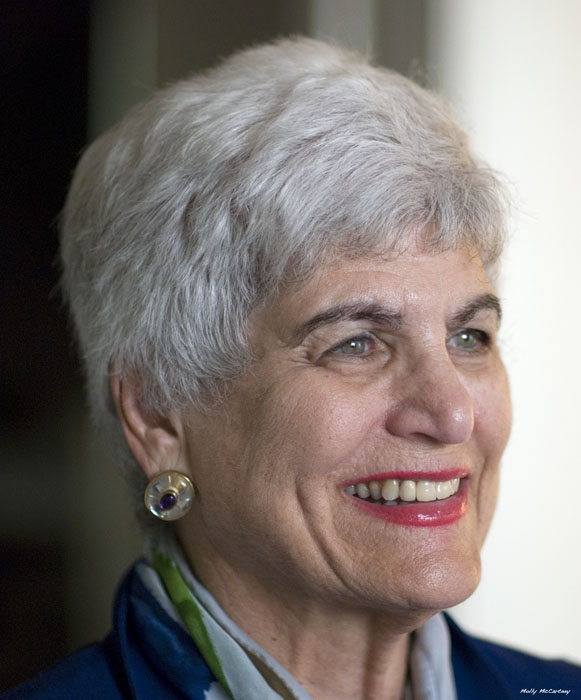
- Photo by Molly McCartney
In her new book, Revitalizing Retirement, author Nancy K. Schlossberg emphasizes that people leaving full-time careers need to plan ahead to have purpose in their lives, a new identity and healthy relationships. An encore career, she says, can help do all of those things.
Purpose, identity and relationships are key components of a “psychological portfolio” that she believes is every bit as critical as a sound financial portfolio for individuals as they transition from their midlife career to new endeavors and, eventually, retirement.
Schlossberg, 80, is a counseling psychologist, author of nine books and professor emerita with the University of Maryland at College Park who specializes in later-life transitions. She now divides her time between Sarasota, Fla., and Washington, D.C.
She emphasizes the need for a psychological portfolio in her latest book, she says, because “I interviewed all kinds of people from age 40 on up about retirement and realized no one was paying attention to the psychological aspects of the changes they were making.”
She believes purpose in life is the difference between why some youngsters become juvenile offenders and others contribute to society. And she thinks it determines whether individuals are happy after they leave their main career or whether they feel hollow.
One example she cited was a serial entrepreneur in his 70s who owned and then sold a number of small newspapers in Maine. On his first day of retirement, his wife went to work, his twin boys went to school, and he stayed at home with his mother-in-law. All of a sudden, he had no identity and no purpose in life, and he was isolated from lots of his former associates.
It didn’t take long for him to call up a woman he knew in the Maine Department of Labor, and soon he had an encore career alongside her, helping others find careers. His new role restored his personal identity, gave him confidence that he was doing meaningful work and connected him with a new circle of friends.
In addition to paying attention to your psychological profile, Schlossberg offers these other tips for a successful transition to retirement:
- Prepare for surprises – “There are going to be positive and negative surprises all through life,” says Schlossberg. Rather than going into a panic when things don’t turn out optimally, she recommends having a “Plan B” and going with the flow.
- Be intentional – In her book she cites the “40 percent solution” coined by Sonja Lyubomirsky, a psychology professor who determined that happiness is determined 50 percent by your emotional baseline, 10 percent by life’s circumstances and 40 percent by “intentional activity” – actions you initiate. “You can control 40 percent of your happiness,” explains Schlossberg, by intentionally changing careers and doing something meaningful.
- Cope and reframe – “Some of the things happening in the work force today you can’t change,” says Schlossberg, “but you can change the meaning and reframe what’s going on.” She gives the example of a woman who left a dead-end job selling cars and began working as a checker at a large supermarket chain. In her mind, it was not an entry-level job but, rather, the first step in a new career that she was certain would lead to a powerful role in the food industry.
Revitalizing Retirement is available from major booksellers or can be purchased directly from the publisher, APA Life Tools. Click here to visit Schlossberg’s Web site.
